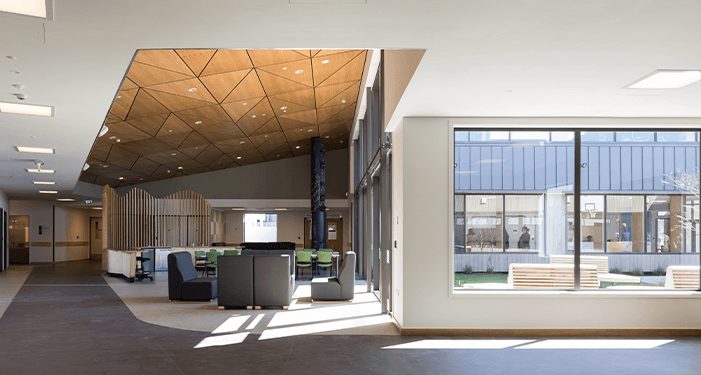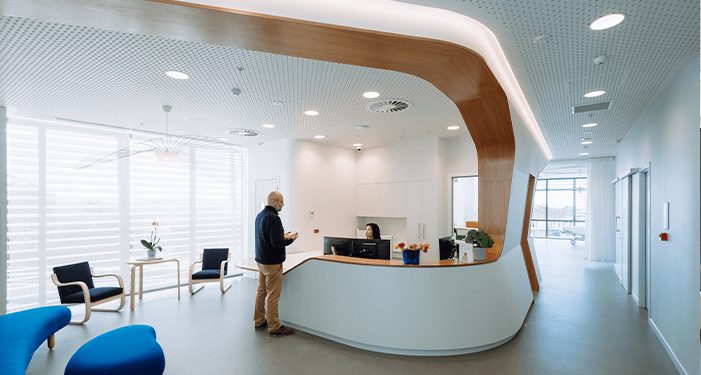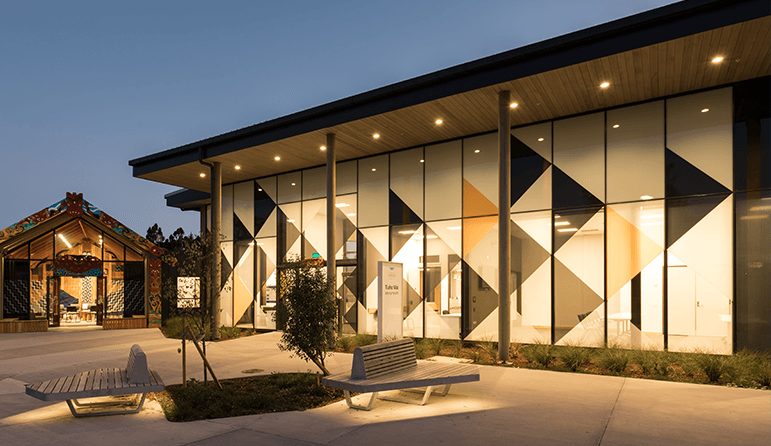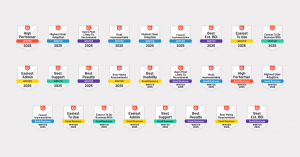Klein have been designing the wellness environment in New Zealand since 1991. They’re all about the power of architectural thinking to change lives for the better through a people-centric practice. We’d say an “oh yes!” to that anytime, but in Covid-19 times, we’re yelling it.
Principal, Melanie Mason, has been with Klein for almost half the company’s life, adding an operations function in recent years. Klein’s information systems manager, and tech lead for their Synergy cloud implementation, Steven Hayes, started with the firm at the beginning of 2020. We were lucky enough duckies to talk to them online and experience an enthusiasm for healthcare design and architecture that couldn’t even be dampened by a struggling internet connection.
With more than 40 staff the Klein team still “feel like a big family”, said Melanie. “We’re team-oriented, we’re collaborative, and we help each other out. That’s one of our big strengths and a feature of the company not having become too big. Our managing director Rachael Rush has always made a point of being available and approachable. So, if you’ve got a problem, you can go straight to the top, which has huge advantages. We’re really passionate about what we do architecturally in the health space — we really pride ourselves on our skill, experience, and how we respond to our clients’ needs. I think those are the kinds of things that make us.”
Never sweeter or more healing words were spoken, and it’s that passion, commitment, care, and personal investment that make us adore Klein. As a customer, but also as a compatriot of the same company ethos as Total Synergy.
The un-synergistic life before Synergy software
We asked Melanie and Steven about business and project life before Synergy, about the arising needs that found them looking for a solution like our cloud platform. With what we came to understand as their signature enthusiasm and eloquence, they articulated integration, practice management, agility, and customer service as priority needs.
“From my point of view, we’d fluctuated around 25 staff for a long time, and with that number it’s still relatively easy to manage ideas a bit more casually,” said Melanie, “but once you start growing a bit more, you need more structure in place. You need more systems and you need more practice management tools, that are more connected.
“We were doing things right, but we had lots of different Excel spreadsheets doing different things in different places. Invoicing was quite separate, timesheeting was separate, and our forecasting was separate. Everything was quite detached.
The healthy view of system integration
“Before Synergy, you had to manually try and run those things together to make decisions about the business, or recruiting, or fees or, ‘should we be going for this project or not?’ — all those sort of decision-making choices you have to make day-to-day in the practice” said Melanie.
“They are big decisions, with big impacts — we always wanted everything to be more integrated so we could see things more easily, more cohesively, so that if we made a change in some way over here, we immediately saw that impact elsewhere. Without needing to duplicate those changes in separate spreadsheets manually.”
“There were some good systems in place before we implemented Synergy, but the problem was the disconnect,” said Steven. “Quite a lot of time had been put into developing different areas of the company and how we managed completely separate tasks. Synergy really shone a light on how flawed that system could be. Things like running invoicing separate to our project management software using two different systems that weren’t actually linked. Those separated processes introduced human error, and we had to go back and try to audit previous projects and gather data about how we’ve performed as a company.
“With the old systems, gathering that sort of data wasn’t really possible. That’s something Synergy’s definitely brought us — the ability to dissect every aspect of the business, at quite a granular level.”
Into the future and beyond with Synergy features
We asked Steven and Melanie about the features of Synergy that Klein most used, because, y’know, we love hearing about what’s most valuable to our customers.
“We committed really early on to the Enterprise licence because we recognized that to fully take advantage of Synergy, we needed all of the features it offers” said Steven. “Smart”, said we!
With the Synergy rollout complete in October of 2019, Steven said, “we did have to learn to crawl before we could walk and started with the basics — project scope, scheduling, and timesheets.
“We’re getting to the point now where we’re doing really fine-tuned resourcing and fee-building directly out of Synergy and that’s really paying dividends and shining light on some really cool things we can achieve with Synergy, I think.
“Obviously from here, we want to continue to roll out as many of the features Synergy has to offer as possible — we’ve got plans to adopt task management and tracking. We’re involved with Synergy in user product review groups, where we get to specify functionality we’d find useful, see some of the coming features, and comments on the direction the development team have taken. And we’re pretty grateful to have been part of that.”
We’re grateful Klein is part of that too. The involvement of our customers in the development of Synergy is crucial to us, in fact. You could call it a cornerstone if you like. A linchpin if you prefer. Or, just ‘our jam’. You get the point.

Klein as part of Synergy development — software by, with, and for AEC designers
Being that industry-specificity is absolutely our jam, we wanted to find out how important Melanie and Steven thought this element of our software is to Klein.
“Absolutely!” said Steven (while we made a note that we really like this guy), “I mean, as we’ve developed and started to use the software more, we’ve come up against things which don’t quite suit us or our workflow as a business — but each time we’ve raised one of these issues they’d either since been addressed and actually updated, or Synergy was aware and were already working on improvements.
“So, it’s actually really exciting to roll Synergy out as it’s being developed so frequently. It’s not the same product that we chose a year ago. It’s completely different. And that’s for the good — there are some great new features that keep being added, updated, and fine-tuned.”
“It seems to be quite tailored to what we do” said Melanie, “and I honestly haven’t seen anything in Synergy that makes me think it’s being adapted from something that suits lawyers, or some other type of business — it all supports and affects the way that we work as building, construction, and industry consultants.”
At this point we added Melanie to the list of people we really like. Honestly though, what’s not to like?! Klein people are infectiously enthusiastic about anything and everything that advances their architecture practice. Bless their cotton socks.
“And once again” said Steven, “when we raise issues with Synergy, if they think that it’s a minor dev process and it would suit everyone, that tends to be the direction they take — other times we’ve had to adapt to use Synergy the way that Synergy is working for our peers. And that’s fine too.”
Success is a personal matter — birds of a business feather
Klein are clearly all about their people and about their people helping their clients help people. So, we asked if they’d interacted with our (frankly, fabulous) people in customer success. Are we trying to show off about our brilliant CS team and their excellence as people? Yes. Yes, we were. Are we sorry? No. No we are not.
“They’re fantastic!” said Steven, “I’m on a first-name basis with almost all of the support team — we’ve probably sent a few memes back and forth with each of them individually.
“Possibly the earliest memory we have of Synergy was getting on a call with Scott Osborne [Total Synergy founder and CEO] that was pretty impactful — he was just really ready to meet with a prospective client. We hadn’t committed to anything at that point. We hadn’t paid a cent for it, it was months before we actually rolled it out, and we were still running trials and just looking at it — but the fact that he had the time of day to meet with us and to talk to us about their research, it really blew us away.
“Since then we’ve had maybe one or two occasions where we’ve had particularly urgent cases that needed support to deal with them immediately, and they were dealt with. Quickly and appropriately. Other times it’s just been little odds and ends and stuff, and they’re always handled really, really well. I have not ever dealt with another company in the tech space that handles support like Synergy does.”
“That philosophy of the CEO taking the time out to speak to prospective clients” said Melanie, “I think that’s what we’re like here at Klein as well. You know, it’s sort of like there’s a bit of — dare I say it? — synergy in the way our companies align, in processes and in the way we run.
“We had looked at another product, but it was big, corporate kind of stuff. You had to deal exclusively with the salesperson. It’s just wasn’t the same — it didn’t really suit our method of working at all.”

Cloud is a must
Here at Total Synergy we’re supremely aware that the future of software is headed in one direction, and one direction only. And that’s up, folks. Given Klein’s foresight and savvy we wanted to know if the cloud-based nature of Synergy was important to them, and whether it had made flexibility in the face of challenges like that other c-word, ‘Rona.
“Certainly, from a convenience perspective, being able to just open the Synergy platform in a browser was super convenient” said Steven, “but we’ve always maintained quite a bit of flexibility to work remotely even prior to rolling out Synergy.”
“It was seamless in terms of working at home or here in the office,” said Melanie.
“I mean, really” said Steven, “the fact that it is cloud-based and browser-based actually is a huge, huge call now that I think about it. We would never have gone with something hosted locally. You know, that’s not the direction that the industry’s going so, we wouldn’t have even thought about it.”
A trial (and ethos) that won the heart of health architects
We asked Klein if they felt there was a tipping point, some particular feature, a specific functionality, that saw them settle on the Synergy cloud platform for their business and project management.
“We were comparing this and [competitor’s redacted name] and Synergy won out largely because of the trial we were able to do” said Steven, “because we could run several trials and actually make a proof-of-concept — put some dummy data in there and actually work with it. The fact that support was so responsive — during the early days Lauren [Palmer] was really fantastic, helping us get set up with several different trials and just testing different aspects of it. The fact that we knew it would work even before committing to anything, meant it was a no-brainer — there’s no other product that would let us try-before-we-buy to the level that Synergy did.”
“It’s a big commitment to invest in a business and project management system” said Melanie, “you have to be sure. If you can’t try-before-you-buy, then it makes it very hard to make that decision. It would’ve taken us a lot longer to get something on board had we not been able to do that. We’d been searching, on and off for five years, for something that would give us a more integrated system. We’d talked about it for a long time, been on the lookout for something that’s more streamlined and gives us the data we need to make decisions more easily for all of us.”
And they found it with Synergy. The first of many Klein decisions made easier by an industry-specific, cloud-based platform supported by excellent human beings. Honestly, if you’re not in love with Klein and their people you need to check your vitals, we suspect you’re in poor health. In which case, you’ll need Klein to architect your wellness. Cycle of excellent life.


